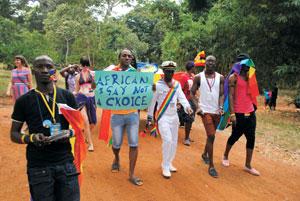For better or worse, the increasingly tense situation for sexual minorities in Uganda and elsewhere in Africa has become a closely monitored news item for many human rights watchers in the West. This spotlight on the widespread criminalization of homosexuality and human rights abuses in many African countries has forced diplomats and activists to ask what they can do to support queer people in countries where discrimination is not just pervasive, but also legislated.
One answer comes from Canadian activist and documentarian Nancy Nicol. Her multifaceted project Envisioning Global LGBT Human Rights, or Envisioning, is an interdisciplinary venture out of Toronto’s York University that seeks to collaborate with queer rights organizations in India, Africa and the Caribbean through funding and shared research. On Sept 12, Envisioning will bring together activists and partners from Uganda and Kenya in Toronto for a panel discussion about the work their groups have accomplished since joining the project.
“We wanted to partner with organizations that were in countries that still had these laws on the books but had capacity on the ground, real organization,” Nicol explains. “We wanted to work with people there who know the conditions, have the cultural sensitivity, knowledge and are working to make change; to support their work by research, field exchange and capacity enhancement.”
In Africa, Envisioning has partners in Kenya, Botswana and Uganda. Although the legal and cultural situations are different in each country, homosexuality is criminal in all three. Yet one partner, the Gay and Lesbian Coalition of Kenya, recently celebrated and documented its inaugural International Day Against Homophobia celebration. The group is demanding decriminalization within five years.
In Uganda, where a parliamentary bill that would punish gay people with the death penalty has refused to die since its 2009 introduction, the coalition group Sexual Minorities of Uganda (SMUG) has also been carrying out advocacy and research despite spirited government repression. With funding and video equipment from Envisioning, SMUG has developed a full-time research and documentary project focusing on queer lives and human rights abuses all over Uganda.
“We are interested in getting the voices that have not been heard, so it’s part of the project to conduct interviews in rural areas,” explains Richard Lusimbo, a SMUG researcher who will be on the panel at York. “People in the city are not as tied to issues like religion or culture, but you find when you go to western Uganda, people are still tied to culture and religion. People can’t express themselves freely because they are scared of what their faith or their priests or their bishop would say.”
But even in cities, gays and lesbians face aggression from a government intricately tied to the church. The minister of internal affairs has recently said he will ban 38 (as yet unnamed) organizations for promoting gay rights, and earlier this summer, the minister of ethics and integrity sent police to break up a capacity-building workshop for queer-human-rights defenders. In September, the organizers will bring the minister to court over this legally unfounded police aggression.
“We are looking forward to seeing the ethics minister cross-examined by our lawyers,” Lusimbo says.
Yet even in the face of such hostility, queer people in Uganda have secured some victories. Images of the country’s first-ever Pride celebration went viral after its great success, which Lusimbo remembers blissfully.
“At that particular moment I felt liberated, because for the very first time, I was marching and shouting that it’s time for our rights; it’s time we are set free,” he recalls. “I was not scared of anything, and all I was caring about was the joy, everything going on around me, and being happy.”
At the subsequent rally, police stormed the area and detained three drag performers, but Lusimbo and a dozen others followed them to the station and shortly won their release.
“We happily went home with our dignity and our heads held high,” Lusimbo reports.
This is the accomplishment of a brave group of Ugandans. But the question remains about what effective exterior support looks like. After the Pride march, hacker group Anonymous attacked government and corporate websites in Uganda, Somalia, Sudan and Botswana. In Uganda, images of the Pride parade were shown, which many see as irresponsible.
“If only they had consulted us. Before you know it, you will hear the government saying homosexuals are terrorists,” Lusimbo says.
Well-meaning but ill-informed actions like the hacking of websites or David Cameron’s recent threat to deny aid where discriminatory policies exist, can have the effect of further demonizing gay people.
“International pressure helps, but how it is done is going to matter. If we are going to have other countries cutting aid to Uganda because of LGBTI, then we are going to be isolated, and the whole community will turn against us,” Lusimbo explains. “We don’t want to give them an opportunity to use our sexuality as something to show that the Western countries are trying to recolonize Uganda.
“I think having dialogue, reaching out to our leaders, is best,” he says. “Many of these people have been approached in private and talked to, and there has been a change.”
As for the role of outsiders, Envisioning has taken the approach of simply following, rather than projecting, the front lines.
“We can have solidarity, we can do supportive work, but we have to educate ourselves,” Nicol says. “We have to listen to people on the ground, and the leadership will come from them.”

 Why you can trust Xtra
Why you can trust Xtra


